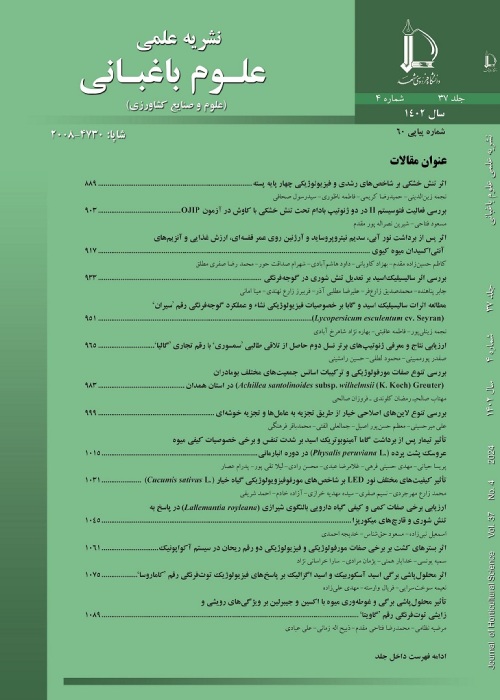Study of Irrigation Interval and Mulch Effects on Pomological Characteristics and Yield of Sevillana Cultivar in Field Condition
Author(s):
Article Type:
Research/Original Article (دارای رتبه معتبر)
Abstract:
Introduction
Olive (Olea europaea L.) is one of the drought tolerant ever green fruit trees. Olive is an economically important species of the Mediterranean area, so understanding the mechanisms by which olive plants face drought stress under environmental conditions is essential for the improvement of olive yield and oil quality. Olive is one of the fruit trees which become important in the Iranian fruit industry at the near future. Mulch is an optimizing strategy under which crops are allowed to sustain some degree of water deficit and yield reduction. Increasing crop water-use efficiency (WUE) through water conservation in the soil is an important component of dry land farming. Mulching is among the water management practices for increasing WUE. Mulch is referred to as any material that is spread onto the surface of the soil for protection against solar radiation or evaporation. Different materials, such as wheat straw, rice straw, plastic film, grass, wood, and sand, are used as mulches.Materials And Methods
This experiment was conducted to study the effect of irrigation interval and mulch on Pomological characteristics and yield of 11-years old Sevillana olive cultivar. A factorial experiment was carried out in Dallaho Olive Research Station at Sarepole located in Kermanshah province. Field experiment based on randomized complete block design with three replications and two factors (irrigation interval and mulch) were conducted in 2015. Each experiment unit consists of 4 trees and 108 trees were used. Irrigation treatments period for experiment were 3, 6 and 10 days interval and mulch treatments for experiment were polyethylene, organic materials and non-mulch (control). Geographical characters was longitude of 45˚, 51΄ E and latitude of 34˚, 30΄ N and the height of sea level 581m. The measured tree characteristics were: Fruit Weight, Pulp Fresh Weight, Pulp Dry Weight, Dry matter, Pulp/Pit ratio, Pit Length, Pit Diameter, Fruit Yield (kg/ tree) and Fruit Yield (kg/ hectare). Reproductive traits were determined by the methods of I.O.O.C.(2002). Collected data were analyzed using SAS program.Results And Discussion
Obtained results showed that mulch and interval irrigation treatments had significant differences in Pomological traits so that mulch and 3 days interval irrigation treatments increased fruit weight, pulp fresh and dry weight, fruit moisture percent, fruit yield kg/ tree and kg/ hectare but fruit weight, pulp fresh and dry weight, fruit moisture percent and Fruit yield kg/ tree and kg/ hectare reduced by drought stress. Mulch application increased fruit weight, fruit length and diameter, pulp fresh and dry weight, fruit moisture percent and fruit yield. Mulch application improved Pomological characteristics such as fruit weight, pulp fresh and dry weight, fruit moisture percent, Fruit yield kg/ tree and kg/ hectare of olive Sevillana cultivar under drought stress and helped to save irrigation water in olive orchards. In the arid and semi arid as well as sub-tropical regions, water shortage is a normal phenomenon and seriously limits the agricultural potential. Therefore, under irrigation or rain-fed conditions, it is important for the available water to be used in the most efficient way. The proper irrigation interval can play a major role in increasing the water use efficiency and the productivity by applying the required amount of water when it is needed. On the other hand, the poor irrigation interval can lead to the development of crop water deficit and result in lower yield due to water and nutrient deficiency. Early in the season when plants are small, it is beneficial to encourage the roots to explore as much of the soil profile as possible. This maximizes nutrient uptake and stress tolerance later in the season. The effect of mulch on yield and its components have been reported in various studies. The effect of mulch on plant yield through changes in soil conditions that can change the soil temperature and soil moisture that influence on the growth and yield. The effect of mulch can be done through weed control, make favorable conditions of temperature and soil moisture, reduce leaching of nutrients and soil fertility, increase the efficiency of water use, increase availability of absorption of nutrients, increased root growth and control of diseases and pests.Conclusion
According to the results of this research, it can be concluded that mulch and interval irrigation had a significant effect on reproductive characteristics. Using mulch improved Pomological characteristics of olive including fruit weight and yield per tree and hactar, fruit length and diameter, pulp fresh and dry weight, fruit moisture percent Under drought stress and helped to save irrigation water in olive orchards.Keywords:
Language:
Persian
Published:
Journal of horticulture science, Volume:31 Issue: 4, 2018
Pages:
815 to 824
magiran.com/p1810194
دانلود و مطالعه متن این مقاله با یکی از روشهای زیر امکان پذیر است:
اشتراک شخصی
با عضویت و پرداخت آنلاین حق اشتراک یکساله به مبلغ 1,390,000ريال میتوانید 70 عنوان مطلب دانلود کنید!
اشتراک سازمانی
به کتابخانه دانشگاه یا محل کار خود پیشنهاد کنید تا اشتراک سازمانی این پایگاه را برای دسترسی نامحدود همه کاربران به متن مطالب تهیه نمایند!
توجه!
- حق عضویت دریافتی صرف حمایت از نشریات عضو و نگهداری، تکمیل و توسعه مگیران میشود.
- پرداخت حق اشتراک و دانلود مقالات اجازه بازنشر آن در سایر رسانههای چاپی و دیجیتال را به کاربر نمیدهد.
دسترسی سراسری کاربران دانشگاه پیام نور!
اعضای هیئت علمی و دانشجویان دانشگاه پیام نور در سراسر کشور، در صورت ثبت نام با ایمیل دانشگاهی، تا پایان فروردین ماه 1403 به مقالات سایت دسترسی خواهند داشت!
In order to view content subscription is required
Personal subscription
Subscribe magiran.com for 70 € euros via PayPal and download 70 articles during a year.
Organization subscription
Please contact us to subscribe your university or library for unlimited access!


